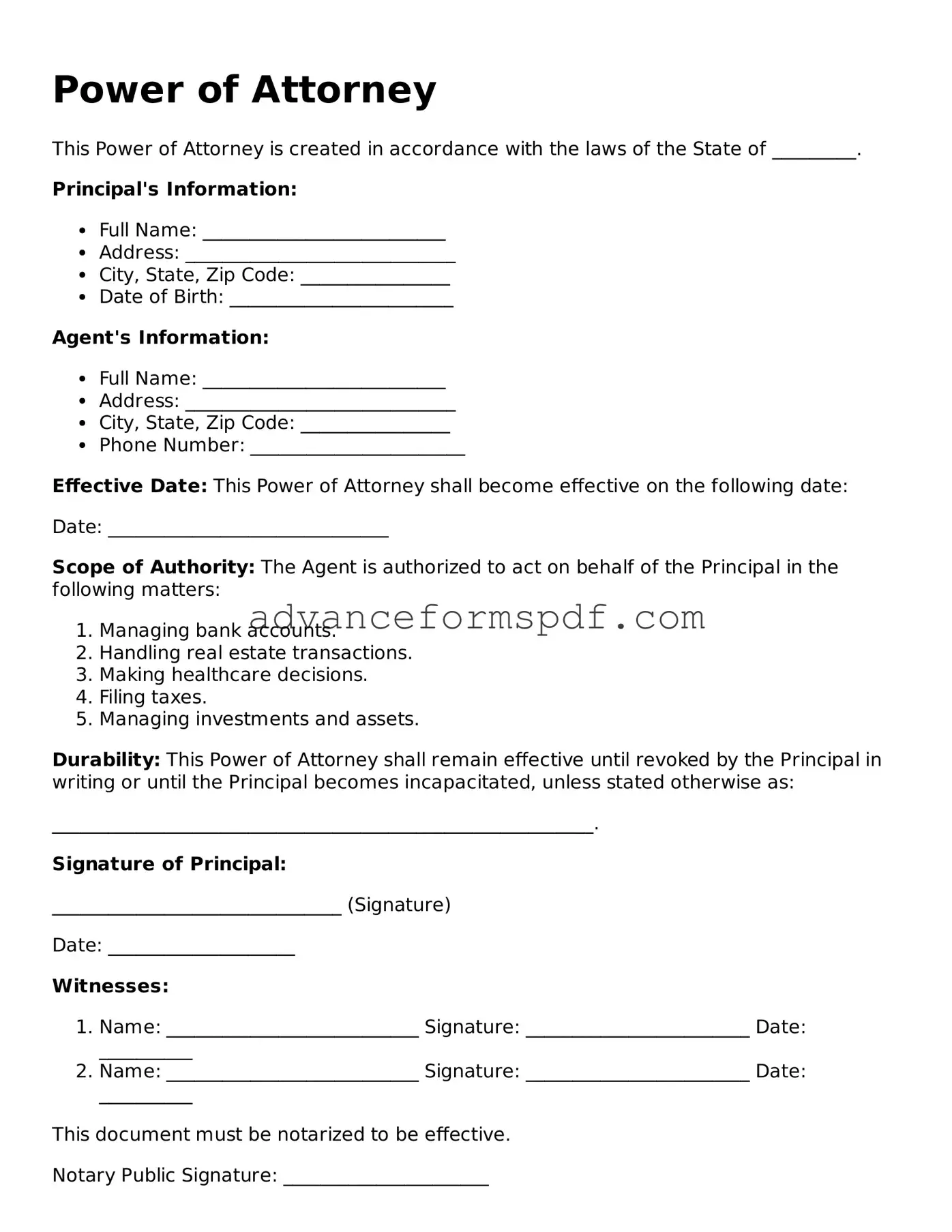Free Power of Attorney Document
When it comes to managing personal affairs, the Power of Attorney (POA) form serves as a crucial tool for individuals seeking to delegate authority to another person. This legal document allows you to appoint someone—often referred to as your agent or attorney-in-fact—to make decisions on your behalf, whether for financial matters, healthcare choices, or other important issues. Understanding the various types of POA, such as durable, springing, and limited, is essential, as each serves different purposes and comes into effect under specific circumstances. Additionally, the process of creating a Power of Attorney involves careful consideration of whom to trust, ensuring that your chosen agent aligns with your values and goals. It's also important to recognize that the POA can be revoked or modified at any time, giving you control over your decisions. As life circumstances change, having a well-drafted Power of Attorney can provide peace of mind, knowing that your interests will be protected even when you cannot advocate for yourself.
State-specific Guidelines for Power of Attorney Documents
Power of Attorney Categories
PDF Specifics
| Fact Name | Description |
|---|---|
| Definition | A Power of Attorney (POA) form allows one person to authorize another to act on their behalf in legal or financial matters. |
| Types of POA | There are different types of POA, including General, Limited, and Durable, each serving distinct purposes and durations. |
| State-Specific Requirements | Each state has its own requirements for a valid POA. For instance, in California, the governing law is the California Probate Code, Sections 4000-4545. |
| Revocation | A Power of Attorney can be revoked at any time by the principal, provided they are mentally competent to do so. |
| Signatures | Most states require the principal's signature and may also require a witness or notary public for the POA to be legally binding. |
How to Write Power of Attorney
Once you have obtained your Power of Attorney form, it’s time to fill it out carefully. This document allows you to designate someone to make decisions on your behalf, so precision is key. Follow these steps to ensure you complete the form correctly.
- Read the Instructions: Begin by thoroughly reviewing any instructions provided with the form. Understanding what is required will make the process smoother.
- Identify the Principal: Fill in your name and contact information as the person granting the power. This section establishes who is giving authority.
- Choose the Agent: Clearly state the name and contact information of the person you are appointing as your agent. This individual will act on your behalf.
- Specify Powers: Indicate the specific powers you wish to grant. Be detailed, as this will define what decisions your agent can make.
- Set the Duration: Decide whether the power is effective immediately, upon a specific event, or for a set duration. Clearly state your choice in the designated area.
- Sign and Date: As the principal, sign and date the form in the appropriate section. Your signature is essential for the document's validity.
- Witnesses and Notarization: Depending on your state’s requirements, have the document witnessed or notarized. This step may be necessary for the form to be legally binding.
After completing these steps, review the form for any errors or omissions. Make sure all required signatures are present. Once satisfied, keep a copy for your records and provide copies to your agent and any relevant parties.
Power of Attorney Example
Power of Attorney
This Power of Attorney is created in accordance with the laws of the State of _________.
Principal's Information:
- Full Name: __________________________
- Address: _____________________________
- City, State, Zip Code: ________________
- Date of Birth: ________________________
Agent's Information:
- Full Name: __________________________
- Address: _____________________________
- City, State, Zip Code: ________________
- Phone Number: _______________________
Effective Date: This Power of Attorney shall become effective on the following date:
Date: ______________________________
Scope of Authority: The Agent is authorized to act on behalf of the Principal in the following matters:
- Managing bank accounts.
- Handling real estate transactions.
- Making healthcare decisions.
- Filing taxes.
- Managing investments and assets.
Durability: This Power of Attorney shall remain effective until revoked by the Principal in writing or until the Principal becomes incapacitated, unless stated otherwise as:
__________________________________________________________.
Signature of Principal:
_______________________________ (Signature)
Date: ____________________
Witnesses:
- Name: ___________________________ Signature: ________________________ Date: __________
- Name: ___________________________ Signature: ________________________ Date: __________
This document must be notarized to be effective.
Notary Public Signature: ______________________
Date: ____________________
Popular Documents
How to Start a Immigration Letter - It serves as a personal statement detailing the relationship and experiences shared as a couple.
Employee Loan Agreement Template - Provides guidelines on how to handle loan non-repayment scenarios.
When engaging in the sale of a motorcycle, it's important to utilize a legally binding document, such as the California Motorcycle Bill of Sale. This form not only confirms the transfer of ownership but also provides necessary details about the motorcycle and both parties involved in the transaction. For more information and resources related to this form, you can visit Top Forms Online, which offers further guidance on ensuring a smooth transfer process.
Imm1294e - The application process is designed to assess the eligibility and intentions of applicants.
